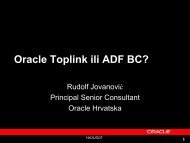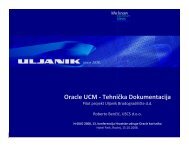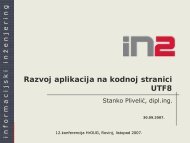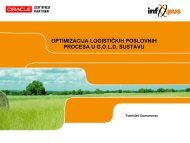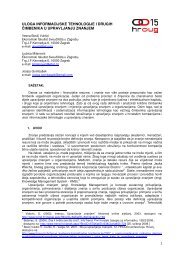Mutexes And Changes in Library Cache - HrOUG
Mutexes And Changes in Library Cache - HrOUG
Mutexes And Changes in Library Cache - HrOUG
Create successful ePaper yourself
Turn your PDF publications into a flip-book with our unique Google optimized e-Paper software.
DbProf.<br />
com<br />
<strong>Mutexes</strong><br />
<strong>And</strong> <strong>Changes</strong> <strong>in</strong> <strong>Library</strong> <strong>Cache</strong><br />
Jože Senegačnik<br />
joze.senegacnik@dbprof.com<br />
www.dbprof.com - © 2012 Jože Senegačnik<br />
Oracle ACE Director<br />
1
DbProf.<br />
com<br />
About the Speaker<br />
Jože Senegačnik<br />
• Owner of Dbprof d.o.o.<br />
• First experience with Oracle Version 4.1 <strong>in</strong> 1988<br />
• 24+ years of experience with Oracle RDBMS.<br />
• Proud member of the OakTable Network www.oaktable.net<br />
• Oracle ACE Director<br />
• Co-author of the OakTable book “Expert Oracle Practices”<br />
by Apress (Jan 2010)<br />
• VP of Slovenian OUG (SIOUG) board<br />
• CISA – Certified IS auditor<br />
• Blog about Oracle: http://joze-senegacnik.blogspot.com<br />
• PPL(A) – private pilot license, <strong>in</strong>strument rated<br />
• Blog about fly<strong>in</strong>g: http://jsenegacnik.blogspot.com<br />
• Blog about Build<strong>in</strong>g Ovens, Bak<strong>in</strong>g and Cook<strong>in</strong>g:<br />
http://senegacnik.blogspot.com<br />
www.dbprof.com - © 2012 Jože Senegačnik<br />
Oracle ACE Director<br />
2
Latches, Hash Buckets & Data Blocks<br />
latches<br />
hash bucket<br />
array<br />
double l<strong>in</strong>ked lists of block headers<br />
DbProf.<br />
com<br />
bucket 0<br />
bucket 1<br />
bucket 2<br />
bucket 3<br />
0.2234 0.1524 ¸2.773 3.188<br />
1.2663 2.9973 3.8623 5.81 4.9162 8.2752<br />
0.72536 2.5243<br />
4.2883 1.25523 1.27377 2.3774 3.12992<br />
..........<br />
_db_block_hash_latches<br />
_db_block_hash_buckets - 1<br />
_db_block_hash_buckets<br />
6.39939 7.2993 5.1234<br />
data<br />
<strong>in</strong>dex<br />
undo<br />
www.dbprof.com - © 2012 Jože Senegačnik<br />
Oracle ACE Director<br />
3
DbProf.<br />
com<br />
Parent / Child Cursors<br />
• Each SQL statement has<br />
– Parent cursor<br />
– One or more child cursors<br />
– Each parent requires at least one child cursor<br />
Parent<br />
Cursor<br />
Child<br />
Cursor<br />
0<br />
Child<br />
Cursor<br />
1<br />
Child<br />
Cursor<br />
2<br />
Child<br />
Cursor<br />
3<br />
www.dbprof.com - © 2012 Jože Senegačnik<br />
Oracle ACE Director<br />
4
DbProf.<br />
com<br />
Structure of the Child Cursor<br />
Handle structure <br />
Object structure <br />
KGLHD<br />
KGLOB<br />
Child<br />
Cursor<br />
Heap 0<br />
Heap 6<br />
Environment<br />
Statistics<br />
B<strong>in</strong>d<br />
Variables<br />
Execution<br />
Plan<br />
www.dbprof.com - © 2012 Jože Senegačnik<br />
Oracle ACE Director<br />
5
DbProf.<br />
com<br />
Object Heaps<br />
• Every object can have optional sub heaps<br />
Heap # Description<br />
0 Object<br />
1 Source<br />
2 DIANA<br />
3 PCODE<br />
4 MCODE<br />
5 Errors<br />
6 SQL Context<br />
7 Free<br />
8 Subord<strong>in</strong>ate Heap<br />
9 Subord<strong>in</strong>ate Heap<br />
10 Subord<strong>in</strong>ate Heap<br />
11 Subord<strong>in</strong>ate Heap<br />
• Both parent and child cursors have sub heap 0<br />
• In addition child cursors have sub heap 6 (execution plan)<br />
www.dbprof.com - © 2012 Jože Senegačnik<br />
Oracle ACE Director<br />
6
DbProf.<br />
com<br />
Memory Allocations<br />
• Memory for objects is comprised from several<br />
partitions which are <strong>in</strong>dependently allocated – so<br />
called heaps.<br />
• Object can have different number of heaps –<br />
object type def<strong>in</strong>es the number of heaps.<br />
• SQL Cursor: has two heaps:<br />
– heap 0 – library cache metadata<br />
– heap 6 – executable representation of the cursor<br />
(sqlarea)<br />
• Each heap is itself comprised of one or more<br />
chunks of memory (usually 4kB but can be also<br />
less), which are contiguous memory.<br />
www.dbprof.com - © 2012 Jože Senegačnik<br />
Oracle ACE Director<br />
7
DbProf.<br />
com<br />
Shared Pool Heaps<br />
www.dbprof.com - © 2012 Jože Senegačnik<br />
Oracle ACE Director<br />
8
DbProf.<br />
com<br />
Multiple Child Cursors<br />
• Can be created for a number of reasons <strong>in</strong>clud<strong>in</strong>g<br />
differences <strong>in</strong>:<br />
– System / Session parameters<br />
– Object translation<br />
– B<strong>in</strong>d variables<br />
– NLS parameters<br />
– CBO environment<br />
– Trac<strong>in</strong>g<br />
– ...<br />
• Check V$SQL_SHARED_CURSOR<br />
– Heap 0 must still exist<br />
– Reports only for child numbers > 0<br />
SELECT TO_CHAR (bitvector,'XXXXXXXXXXXXXXXX'),<br />
COUNT(*) FROM x$kkscs<br />
GROUP BY TO_CHAR (bitvector,'XXXXXXXXXXXXXXXX')<br />
ORDER BY 1;<br />
www.dbprof.com - © 2012 Jože Senegačnik<br />
Oracle ACE Director<br />
9
Benefits of SESSION_CACHED_CURSORS<br />
DbProf.<br />
com<br />
• When cursor is <strong>in</strong> the session cursor cache then<br />
the cost of f<strong>in</strong>d<strong>in</strong>g cursor <strong>in</strong> SGA is m<strong>in</strong>imal.<br />
– less latch<strong>in</strong>g<br />
– less CPU<br />
– Concurrency improvement will apply only to already<br />
closed cursors which are afterwards reparsed several<br />
times.<br />
• Negative effect: cursors are partly p<strong>in</strong>ned (heap<br />
0) and therefore we should check the size of<br />
shared pool.<br />
• More cached cursors less candidates for ag<strong>in</strong>g<br />
out – for free<strong>in</strong>g memory!!!<br />
www.dbprof.com - © 2012 Jože Senegačnik<br />
Oracle ACE Director<br />
10
Efficiency of sett<strong>in</strong>g SESSION_CACHED_CURSORS<br />
DbProf.<br />
com<br />
• We can check the efficiency of sett<strong>in</strong>g session_cached_cursors parameters with event<br />
10270 ("Debug shared cursors“) at level 10.<br />
• SQL> alter session set events '10270 trace name context forever, level 10';<br />
• session_cached_cursors = 0<br />
#1: check<strong>in</strong>g for already p<strong>in</strong>ned child<br />
#1: no valid child p<strong>in</strong>ned<br />
#1: p<strong>in</strong>n<strong>in</strong>g parent <strong>in</strong> shared mode to search 68509d68 694dcce0<br />
#1: ksfbc: call<strong>in</strong>g kksSearchChildList outside while loop<br />
#1: kkslce: next child is #1<br />
#1: kkslce: p<strong>in</strong>n<strong>in</strong>g child #1 <strong>in</strong> shared mode 6832a12c 69f44490<br />
#1: kksCheckCriteria: call<strong>in</strong>g kksauc<br />
#1: kksCheckCriteria: unp<strong>in</strong>n<strong>in</strong>g the parent<br />
• session_cached_cursors > 0<br />
#1: check<strong>in</strong>g for already p<strong>in</strong>ned child<br />
#1: no valid child p<strong>in</strong>ned<br />
#1: child already locked 68509d68, check<strong>in</strong>g for validity<br />
• Each l<strong>in</strong>e means one step <strong>in</strong> perform<strong>in</strong>g soft parse. When this parameter is set to<br />
values bigger than 0 then the soft parse is even “softer”.<br />
www.dbprof.com - © 2012 Jože Senegačnik<br />
Oracle ACE Director<br />
11
DbProf.<br />
com<br />
V$SYS_TIME_MODEL<br />
SQL> select <strong>in</strong>st_id,stat_name, round(value/1000000,0) as seconds<br />
from gv$sys_time_model order by 2;<br />
INST_ID STAT_NAME<br />
SECONDS<br />
------- ------------------------------------------------ --------<br />
2 PL/SQL compilation elapsed time 6847<br />
1 PL/SQL compilation elapsed time 2548<br />
2 PL/SQL execution elapsed time 64182<br />
1 PL/SQL execution elapsed time 42829<br />
2 failed parse (out of shared memory) elapsed time 0<br />
1 failed parse (out of shared memory) elapsed time 0<br />
2 failed parse elapsed time 1827<br />
1 failed parse elapsed time 441<br />
2 hard parse (b<strong>in</strong>d mismatch) elapsed time 259<br />
1 hard parse (b<strong>in</strong>d mismatch) elapsed time 86<br />
2 hard parse (shar<strong>in</strong>g criteria) elapsed time 2112<br />
1 hard parse (shar<strong>in</strong>g criteria) elapsed time 881<br />
1 hard parse elapsed time 9280<br />
2 hard parse elapsed time 29582<br />
2 parse time elapsed 33952<br />
1 parse time elapsed 10805<br />
1 repeated b<strong>in</strong>d elapsed time 59<br />
2 repeated b<strong>in</strong>d elapsed time 142<br />
1 sql execute elapsed time 288100<br />
2 sql execute elapsed time 1017934<br />
...<br />
www.dbprof.com - © 2012 Jože Senegačnik<br />
Oracle ACE Director<br />
12
DbProf.<br />
com<br />
Pars<strong>in</strong>g Latches (Prior <strong>Mutexes</strong>)<br />
• Hard parse requires:<br />
– library cache latch, shared pool latch, library cache p<strong>in</strong>, execute<br />
– These latches are required for memory allocation (shared pool<br />
latch) and object creation (library cache latch)<br />
• Soft Parse<br />
– library cache latch, library cache p<strong>in</strong>, execution<br />
– Latches are required for object lookup and execution<br />
• Session cached cursor<br />
– library cache p<strong>in</strong>, execute<br />
– <strong>Cache</strong> lookup, object execution<br />
• Re-execut<strong>in</strong>g open cursor<br />
– library cache p<strong>in</strong>, execution<br />
– Object execution<br />
www.dbprof.com - © 2012 Jože Senegačnik<br />
Oracle ACE Director<br />
13
DbProf.<br />
com<br />
<strong>Library</strong> <strong>Cache</strong> Misses (1)<br />
• 2 types of “library cache misses”<br />
– Misses <strong>in</strong> library cache dur<strong>in</strong>g parse -> Misses while look<strong>in</strong>g for<br />
execution plan <strong>in</strong> library cache – this means “Hard parse” - normal<br />
situation<br />
– Misses <strong>in</strong> library cache dur<strong>in</strong>g execute -> Misses while about to<br />
execute the plan and found it miss<strong>in</strong>g/<strong>in</strong>valid <strong>in</strong> library cache<br />
• Reasons for library cache miss dur<strong>in</strong>g execution:<br />
– Statement <strong>in</strong>validation due to some significant change has occurred to<br />
the referenced objects<br />
– Execution plan was flushed from the library cache (and “reloaded”) fairly<br />
frequently due to the demand for free memory<br />
• Execution plans are re-creatable, so they can be flushed from memory even<br />
when the cursor is be<strong>in</strong>g held by the client.<br />
• Investigation to determ<strong>in</strong>e the right cause:<br />
– library cache misses reported <strong>in</strong> SQL trace (10046 trace)<br />
– Exam<strong>in</strong><strong>in</strong>g V$SQL area<br />
www.dbprof.com - © 2012 Jože Senegačnik<br />
Oracle ACE Director<br />
14
DbProf.<br />
com<br />
<strong>Mutexes</strong><br />
www.dbprof.com - © 2012 Jože Senegačnik<br />
Oracle ACE Director<br />
15
DbProf.<br />
com<br />
Purpose of <strong>Mutexes</strong><br />
• Mutex - mutual exclusion algorithms are used <strong>in</strong> so called<br />
critical section of the computer code to avoid the concurrent<br />
use of un-shareable resources.<br />
• Mutex is used with<strong>in</strong> Oracle as a low-level serialization<br />
mechanism to control access to shared data structures <strong>in</strong> the<br />
SGA. (Similarly like latches)<br />
• Serialization is required to avoid an object be<strong>in</strong>g:<br />
– read while someone is modify<strong>in</strong>g it<br />
– modified while someone is modify<strong>in</strong>g it<br />
– modified while someone is read<strong>in</strong>g it<br />
– de-allocated while someone is access<strong>in</strong>g it<br />
• S<strong>in</strong>ce Oracle 10gR2 mutexes are used to protect the shared<br />
cursor component of the library cache.<br />
www.dbprof.com - © 2012 Jože Senegačnik<br />
Oracle ACE Director<br />
16
DbProf.<br />
com<br />
Mutex Hold<strong>in</strong>g Modes<br />
• S - Shared mode. The reference (ref) count is<br />
used to store<br />
– the total number of sessions referenc<strong>in</strong>g a mutex <strong>in</strong> S<br />
(shared) mode<br />
– Used as a replacement for the library cache p<strong>in</strong> to<br />
protect ag<strong>in</strong>g out whilst the object is used. Only a ref<br />
count is <strong>in</strong>cremented / decremented.<br />
• X –exclusive mode – when held only by one<br />
session<br />
www.dbprof.com - © 2012 Jože Senegačnik<br />
Oracle ACE Director<br />
17
DbProf.<br />
com<br />
Mutex Benefits (1)<br />
• Smaller and faster<br />
– faster to get <strong>in</strong> comparison with latches and use less memory<br />
• Less potential for false collision<br />
– Latches usually protect multiple objects and are therefore<br />
candidates for false contention – it is contention for the latch<br />
rather than the shared resource they protect.<br />
– <strong>Mutexes</strong> are smaller and are usually part of the structure they<br />
protect or there may be several mutexes to protect one structure.<br />
Therefore false contention is less likely.<br />
• Use more flexible wait strategy<br />
– wait can be: block<strong>in</strong>g wait, sleep or CPU yield<br />
• They can be held <strong>in</strong> shared or exclusive mode.<br />
www.dbprof.com - © 2012 Jože Senegačnik<br />
Oracle ACE Director<br />
18
DbProf.<br />
com<br />
Mutex Benefits (2)<br />
• Re-execut<strong>in</strong>g SQL statements already loaded <strong>in</strong> the library cache.<br />
• When <strong>Library</strong> cache p<strong>in</strong> is used:<br />
– Cursor must be p<strong>in</strong>ned by each session prior execution.<br />
– <strong>Library</strong> cache p<strong>in</strong> must be acquired when cursor is left opened for reexecution<br />
and CURSOR_SPACE_FOR_TIME=FALSE.<br />
– <strong>Library</strong> cache p<strong>in</strong> is not required when cursor is left opened for re-<br />
execution and can be rebound and<br />
CURSOR_SPACE_FOR_TIME=TRUE.<br />
• <strong>Mutexes</strong> <strong>in</strong>stead of a “library cache p<strong>in</strong>”<br />
– When mutexes are used <strong>in</strong>stead of library cache p<strong>in</strong> replacements,<br />
CURSOR_SPACE_FOR_TIME does not need to be set. The session<br />
execut<strong>in</strong>g shared cursor will only need a mutex p<strong>in</strong> – it will <strong>in</strong>crement<br />
the ref count when re-execut<strong>in</strong>g the cursor.<br />
– Parent exam<strong>in</strong>ation: The parent cursor is exam<strong>in</strong>ed when f<strong>in</strong>d<strong>in</strong>g a child<br />
cursor to execute. Mutex is used for the parent exam<strong>in</strong>ation.<br />
– Build<strong>in</strong>g a new cursor under a parent – is cheaper, however build<strong>in</strong>g<br />
many cursors under a parent cursor is not recommended.<br />
www.dbprof.com - © 2012 Jože Senegačnik<br />
Oracle ACE Director<br />
19
DbProf.<br />
com<br />
Mutex Benefits (3)<br />
• Query<strong>in</strong>g SQL statistics via V$SQLSTATS<br />
• V$SQLSTATS uses mutexes and therefore performs<br />
better than access<strong>in</strong>g statistics via v$sqlarea or v$sql<br />
– less CPU<br />
– significantly fewer latch gets<br />
www.dbprof.com - © 2012 Jože Senegačnik<br />
Oracle ACE Director<br />
20
DbProf.<br />
com<br />
Mutex Creation and Usage<br />
• The mutex can either be stored with<strong>in</strong> the structure it<br />
protects, or elsewhere.<br />
• They are usually dynamically created at the same time as<br />
the structure they protect.<br />
• When embedded with<strong>in</strong> the structure it protects, then they<br />
will share the dest<strong>in</strong>y of the structure - they will be<br />
destroyed when the own<strong>in</strong>g structure is destroyed (freed).<br />
• <strong>Mutexes</strong> can be def<strong>in</strong>ed and used <strong>in</strong> many different ways:<br />
– Each structure be<strong>in</strong>g protected by a mutex can have its own mutex<br />
(e.g. a parent cursor has its own mutex, and each child cursor has<br />
its own mutex)<br />
– Each structure can be protected by more than one mutex, with<br />
each mutex protect<strong>in</strong>g a different part of the structure<br />
– A mutex can protect more than one structure.<br />
www.dbprof.com - © 2012 Jože Senegačnik<br />
Oracle ACE Director<br />
21
DbProf.<br />
com<br />
<strong>Library</strong> <strong>Cache</strong> Latch<br />
latches<br />
hash bucket<br />
array<br />
l<strong>in</strong>ked lists of handles<br />
_kgl_latch_count<br />
bucket 0<br />
bucket 1<br />
......<br />
_kgl_bucket_count-1<br />
_kgl_bucket_count<br />
handle handle handle<br />
SQL SQL SQL<br />
SQL or PL/SQL<br />
library cache<br />
objects<br />
SQL<br />
SQL<br />
SQL<br />
......<br />
www.dbprof.com - © 2012 Jože Senegačnik<br />
Oracle ACE Director<br />
22
DbProf.<br />
com<br />
<strong>Library</strong> <strong>Cache</strong> <strong>Mutexes</strong><br />
<strong>Mutexes</strong><br />
hash bucket<br />
array<br />
l<strong>in</strong>ked lists of handles<br />
......<br />
bucket 0<br />
bucket 1<br />
......<br />
handle handle handle<br />
......<br />
bucket 131071<br />
SQL SQL SQL<br />
SQL<br />
131072 mutexes<br />
_kgl_bucket_count=9<br />
buckets =<br />
(2^_kgl_bucket_count*256)<br />
SQL or PL/SQL<br />
library cache<br />
objects<br />
SQL<br />
SQL<br />
www.dbprof.com - © 2012 Jože Senegačnik<br />
Oracle ACE Director<br />
23
DbProf.<br />
com<br />
Mutex Types and Sleeps<br />
select mutex_type,count(*)<br />
from sys.v$mutex_sleep_history<br />
group by mutex_type order by 2 desc;<br />
MUTEX_TYPE COUNT(*)<br />
-------------------------------- ----------<br />
<strong>Library</strong> <strong>Cache</strong> 602<br />
Cursor P<strong>in</strong> 42<br />
Cursor Stat 5<br />
Cursor Parent 1<br />
4 rows selected.<br />
(from a production database 11.2.0.2 with about 1000 sessions)<br />
www.dbprof.com - © 2012 Jože Senegačnik<br />
Oracle ACE Director<br />
24
DbProf.<br />
com<br />
Mutex Locations<br />
select mutex_type,location,count(*)<br />
from v$mutex_sleep_history<br />
group by mutex_type,location order by 3 desc<br />
MUTEX_TYPE LOCATION COUNT(*)<br />
-------------- ---------------------------------------- ----------<br />
<strong>Library</strong> <strong>Cache</strong> kglp<strong>in</strong>1 4 171<br />
<strong>Library</strong> <strong>Cache</strong> kglget1 1 105<br />
<strong>Library</strong> <strong>Cache</strong> kglpndl1 95 104<br />
<strong>Library</strong> <strong>Cache</strong> kglpnal1 90 84<br />
<strong>Library</strong> <strong>Cache</strong> kglhdgn2 106 44<br />
<strong>Library</strong> <strong>Cache</strong> kglhdgn1 62 25<br />
<strong>Library</strong> <strong>Cache</strong> kgllkc1 57 25<br />
Cursor P<strong>in</strong> kksfbc [KKSCHLFSP2] 18<br />
<strong>Library</strong> <strong>Cache</strong> kgllkdl1 85 16<br />
<strong>Library</strong> <strong>Cache</strong> kglget2 2 16<br />
Cursor P<strong>in</strong> kksLockDelete [KKSCHLPIN6] 12<br />
Cursor P<strong>in</strong> kkslce [KKSCHLPIN2] 11<br />
<strong>Library</strong> <strong>Cache</strong> kglobpn1 71 9<br />
Cursor Stat kkocsStoreB<strong>in</strong>dAwareStats [KKSSTALOC8] 5<br />
Cursor Parent kkscsAddChildNode [KKSPRTLOC34] 1<br />
Cursor P<strong>in</strong> kksfbc [KKSCHLPIN1] 1<br />
<strong>Library</strong> <strong>Cache</strong> kgllldl2 112 1<br />
<strong>Library</strong> <strong>Cache</strong> kglhdgh1 64 1<br />
<strong>Library</strong> <strong>Cache</strong> kglhbh1 63 1<br />
19 rows selected.<br />
www.dbprof.com - © 2012 Jože Senegačnik<br />
Oracle ACE Director<br />
25
DbProf.<br />
com<br />
Hight Version Count Statements<br />
select sql_id,version_count,substr(sql_text,1,30)<br />
from v$sqlarea where version_count > 100<br />
order by 2 desc;<br />
SQL_ID VERSION_COUNT SUBSTR(SQL_TEXT,1,30)<br />
------------- ------------- ------------------------------<br />
0v3dvmc22qnam 2799 <strong>in</strong>sert <strong>in</strong>to sys.col_usage$ (ob<br />
14n9gy4jw9nuh 620 SELECT effect_date, cnt_dr, su<br />
2bpp4r8ajsuz3 328 select ID,SERVICEID,ACCT_ID,<br />
f711myt0q6cma 291 <strong>in</strong>sert <strong>in</strong>to sys.aud$( sessioni<br />
7a85zvjn43j6r 278 INSERT INTO XMS_PAYMENT (<br />
a9s5xz5v4qw95 166 select ID,SERVICEID,ACCT_ID,<br />
dyfyjuyfpn8rm 148 select /*+ RULE */ L.LDATE,L.E<br />
83cq1aqjw5gmg 110 select ownername,classname,met<br />
8 rows selected.<br />
www.dbprof.com - © 2012 Jože Senegačnik<br />
Oracle ACE Director<br />
26
DbProf.<br />
com<br />
The Mystery of Numbers<br />
select count(*) from v$sql_shared_cursor where sql_id='0v3dvmc22qnam';<br />
COUNT(*)<br />
----------<br />
1<br />
select count(*) from v$sql where sql_id='0v3dvmc22qnam';<br />
COUNT(*)<br />
----------<br />
1<br />
select count(*) from sys.x$kglob where kglobt03='0v3dvmc22qnam';<br />
COUNT(*)<br />
----------<br />
2800<br />
www.dbprof.com - © 2012 Jože Senegačnik<br />
Oracle ACE Director<br />
27
DbProf.<br />
com<br />
Mutex Usage - “Cursor Parent”<br />
• Mutex type: ‘Cursor Parent’<br />
• Used <strong>in</strong> parent-cursor operations:<br />
– build<strong>in</strong>g a new cursor under a parent<br />
• wait event ‘cursor: mutex X’<br />
– exam<strong>in</strong><strong>in</strong>g a parent<br />
• wait event ‘cursor: mutex S’<br />
– b<strong>in</strong>d capture<br />
• wait event ‘cursor: mutex X’<br />
www.dbprof.com - © 2012 Jože Senegačnik<br />
Oracle ACE Director<br />
28
DbProf.<br />
com<br />
Mutex Usage – “Cursor Statistics”<br />
• Mutex type ‘Cursor Stat’<br />
• Used for cursor statistics operations:<br />
– build<strong>in</strong>g and updat<strong>in</strong>g cursor-related statistics<br />
• wait event ‘cursor: mutex X’<br />
– exam<strong>in</strong><strong>in</strong>g cursor-related statistics (usually query<strong>in</strong>g<br />
v$sqlstats)<br />
• wait event ‘cursor: mutex S’<br />
www.dbprof.com - © 2012 Jože Senegačnik<br />
Oracle ACE Director<br />
29
DbProf.<br />
com<br />
Mutex Usage – “Cursor P<strong>in</strong>”<br />
• ‘library cache p<strong>in</strong>’ is replaced by a mutex and a ref count.<br />
Used for p<strong>in</strong>n<strong>in</strong>g (e.g. for execution), or compil<strong>in</strong>g a child<br />
cursor.<br />
• Used <strong>in</strong> 10.2.0.2+ and library cache p<strong>in</strong>s are not used any<br />
more (no ‘library cache p<strong>in</strong>’ wait events)<br />
• Used for:<br />
– P<strong>in</strong>n<strong>in</strong>g a cursor for execute<br />
• wait event: ‘cursor: p<strong>in</strong> S wait on X’<br />
– When p<strong>in</strong>n<strong>in</strong>g a cursor for execute, and the cursor is currently<br />
be<strong>in</strong>g exam<strong>in</strong>ed by another S<br />
• wait event ‘cursor: p<strong>in</strong> S’<br />
– Cursor rebuild<br />
• wait event (‘cursor: p<strong>in</strong> X‘).<br />
• This event should not be seen typically, because if a cursor is currently<br />
be<strong>in</strong>g used, and it needs to be rebuilt, another cursor will be created<br />
www.dbprof.com - © 2012 Jože Senegačnik<br />
Oracle ACE Director<br />
30
DbProf.<br />
com<br />
V$MUTEX_SLEEP<br />
SQL> select * from GV$MUTEX_SLEEP order by 2,3;<br />
INST_ID MUTEX_TYPE LOCATION SLEEPS WAIT_TIME<br />
------- ------------- --------------------------- ------ ----------<br />
2 Cursor Parent kksfbc [KKSPRTLOC1] 2 12<br />
1 Cursor Parent kksfbc [KKSPRTLOC2] 1 3<br />
2 Cursor Parent kksfbc [KKSPRTLOC2] 9 38<br />
2 Cursor Parent kksfbc [KKSPRTLOC3] 1 7<br />
2 Cursor Parent kkspsc0 [KKSPRTLOC26] 57 297<br />
1 Cursor Parent kkspsc0 [KKSPRTLOC26] 10 44<br />
2 Cursor Parent kkspsc0 [KKSPRTLOC27] 61 321<br />
1 Cursor Parent kkspsc0 [KKSPRTLOC27] 22 96<br />
2 Cursor P<strong>in</strong> kksLockDelete [KKSCHLPIN6] 6 23<br />
1 Cursor P<strong>in</strong> kksfbc [KKSCHLFSP2] 253 3091383<br />
2 Cursor P<strong>in</strong> kksfbc [KKSCHLFSP2] 494 5864297<br />
1 Cursor P<strong>in</strong> kksfbc [KKSCHLPIN1] 2 27080<br />
1 Cursor P<strong>in</strong> kkslce [KKSCHLPIN2] 24852 384452146<br />
2 Cursor P<strong>in</strong> kkslce [KKSCHLPIN2] 92401 1433220667<br />
kks – location <strong>in</strong> the code – <strong>in</strong> this case this part of code is support for manag<strong>in</strong>g shared cursors/ shared<br />
sql (see Metal<strong>in</strong>k Note:175982.1 - ORA-600 lookup Error Categories )<br />
Data from 2-node RAC 10.2.0.1 Standard Edition – the <strong>in</strong>stance was runn<strong>in</strong>g for 9 days<br />
www.dbprof.com - © 2012 Jože Senegačnik<br />
Oracle ACE Director<br />
31
DbProf.<br />
com<br />
“Cursor: p<strong>in</strong> S wait on X” waits<br />
• MOS ID 786507.1<br />
• A session waits on this event when request<strong>in</strong>g a mutex for shareable<br />
operations related to p<strong>in</strong>s (such as execut<strong>in</strong>g a cursor), but the mutex<br />
cannot be granted because it is be<strong>in</strong>g held exclusively by another session<br />
(which is most likely pars<strong>in</strong>g the cursor).<br />
• Causes:<br />
– Frequent Hard Parses<br />
• If the frequency of Hard Pars<strong>in</strong>g is extremely high, then contention can occur on this<br />
p<strong>in</strong>.<br />
– High Version Counts<br />
• When Version counts become excessive, a long cha<strong>in</strong> of versions needs to be<br />
exam<strong>in</strong>ed and this can lead to contention on this event<br />
• One of the most likely causes of cursor: p<strong>in</strong> S wait on X is high<br />
pars<strong>in</strong>g time.<br />
www.dbprof.com - © 2012 Jože Senegačnik<br />
Oracle ACE Director<br />
32
DbProf.<br />
com<br />
Blocker Session Id<br />
• select p2raw from v$session where event = 'cursor: p<strong>in</strong><br />
S wait on X';<br />
P2RAW<br />
----------------<br />
0000001F00000000<br />
<br />
<br />
• Blocker session_id is <strong>in</strong> top 8 bytes.<br />
• 0000001F (hex) = 31 (decimal).<br />
www.dbprof.com - © 2012 Jože Senegačnik<br />
Oracle ACE Director<br />
33
DbProf.<br />
com<br />
Cursor: p<strong>in</strong> S<br />
• A session waits for "cursor: p<strong>in</strong> S" when it wants a specific mutex <strong>in</strong> S<br />
(share) mode on a specific cursor and there is no concurrent X holder but it<br />
could not acquire that mutex immediately.<br />
• A wait on "cursor: p<strong>in</strong> S" thus occurs if a session cannot make that atomic<br />
change <strong>in</strong> ref count immediately due to other concurrent requests.<br />
• Wait event parameters:<br />
– P1 = idn<br />
• Mutex identifier which matches to the HASH_VALUE of the SQL statement<br />
that we are wait<strong>in</strong>g to get the mutex on.<br />
– P2 = value<br />
• The value is made up of 2 parts:<br />
• High 8 order bits conta<strong>in</strong> the session id of the session hold<strong>in</strong>g the mutex<br />
• Low order bits conta<strong>in</strong> a reference count (like the number of other S mode holders)<br />
– P3 = where (where | sleeps)<br />
www.dbprof.com - © 2012 Jože Senegačnik<br />
Oracle ACE Director<br />
34
DbProf.<br />
com<br />
High Version Count and Cursortrace<br />
• alter system set events ‘immediate trace name<br />
cursortrace level 577, address hash_value’;<br />
• High SQL Version Counts - Script to determ<strong>in</strong>e reason(s) [ID<br />
438755.1]<br />
• Milad<strong>in</strong> Modrakovic:Cursor high_version count Part 1<br />
• http://oraclue.com/2008/12/03/cursor-high_version-count-1/<br />
www.dbprof.com - © 2012 Jože Senegačnik<br />
Oracle ACE Director<br />
35
DbProf.<br />
com<br />
Card<strong>in</strong>ality Feedback Tun<strong>in</strong>g<br />
select sql_id,count(*)<br />
from v$sql_shared_cursor<br />
where use_feedback_stats='Y'<br />
group by sql_id order by 2 desc;<br />
SQL_ID COUNT(*)<br />
------------- ----------<br />
b7xhjjbmqdms4 5<br />
gu7my5yzjm1ap 3<br />
7s909d9xhykp9 3<br />
2dfqzhstwt3hx 2<br />
9j2zwk9b9zbwg 2<br />
4hnwhsp5p4wwb 2<br />
05uzz5j7qtf77 2<br />
ff5spha9pjuyu 2<br />
4rvk1jwvkam8a 2<br />
www.dbprof.com - © 2012 Jože Senegačnik<br />
Oracle ACE Director<br />
36
DbProf.<br />
com<br />
Card<strong>in</strong>ality Feedback Tun<strong>in</strong>g<br />
select sql_text from v$sql where sql_id = 'b7xhjjbmqdms4';<br />
SQL_TEXT<br />
----------------------------------------------------------------------------------------------<br />
SELECT axs_profid as Id, name as Name FROM axs_profile WHERE is_named > 0 ORDER BY Name<br />
SELECT axs_profid as Id, name as Name FROM axs_profile WHERE is_named > 0 ORDER BY Name<br />
SELECT axs_profid as Id, name as Name FROM axs_profile WHERE is_named > 0 ORDER BY Name<br />
SELECT axs_profid as Id, name as Name FROM axs_profile WHERE is_named > 0 ORDER BY Name<br />
SELECT axs_profid as Id, name as Name FROM axs_profile WHERE is_named > 0 ORDER BY Name<br />
5 rows selected.<br />
www.dbprof.com - © 2012 Jože Senegačnik<br />
Oracle ACE Director<br />
37
DbProf.<br />
com<br />
References<br />
• Julian Dyke, F<strong>in</strong>d<strong>in</strong>g the Trash <strong>in</strong> the <strong>Library</strong> <strong>Cache</strong>,<br />
UKOUG 2006<br />
• Understand<strong>in</strong>g Shared Pool Memory Structures, Oracle<br />
White Paper, September 2005<br />
www.dbprof.com - © 2012 Jože Senegačnik<br />
Oracle ACE Director<br />
38
DbProf.<br />
com<br />
Thank you for your <strong>in</strong>terest!<br />
Q&A<br />
www.dbprof.com - © 2012 Jože Senegačnik<br />
Oracle ACE Director<br />
39









